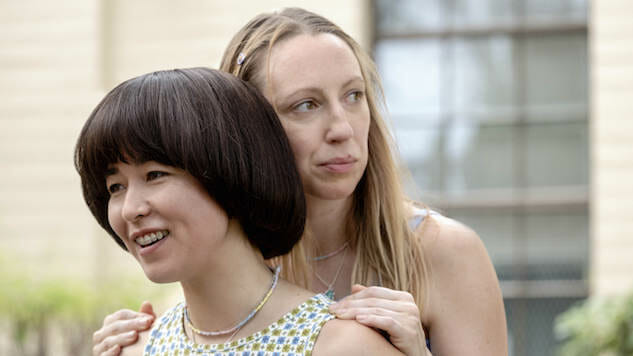Hulu’s PEN15 Captures Middle School’s Disgusting, Giddy Glory—With a Twist
Photo: Alex Lombardi/Hulu
We’ve all gotten it. The kindly exhortation from a teacher, a mentor, a parent who was tickled by our nascent attempts to express ourselves on the page. “Write what you know.” Indeed, in an angry, stay-in-your-lane age, autobiography can seem like the only safe terrain (other than adaptations of stories that have already been adapted more than three times). Writing what we know is a great way to build confidence, a feeling of authority—a voice. But is that enough? How do you know whether you know enough to create a given thing? Everyone has a voice; everyone’s voice is unique. But I’m thinking perhaps the less mature and experienced your voice is, the more you stand to profit from getting outside—well outside—your immediate personal experience. Maybe that’s why there are many impressive child actors and very few impressive child novelists, I don’t know. (Hey, check it: I’m writing what I don’t know!)
Two young women make a comedy about middle school. It’s based on their own experiences, and they name the characters eponymously: Maya (Maya Erskine) and Anna (Anna Konkle). Then they make a really interesting choice, casting their 30-ish selves as the 13-year-old principal characters, and surround themselves with a supporting cast of actual middle schoolers. The result is so excruciatingly awkward it probably out-awkwards actual middle school, which is no small feat. Erskine and Konkle absolutely hurl themselves into the roles, sparing nothing in their quest to anatomize seventh grade in all its disgusting, giddy glory. They’re hilarious, and there are moments when you entirely forget they’re adults. And then there are moments when that fact sticks out like a sore thumb and those moments are possibly the best, because they evoke the competing impulses of the age—to race into adulthood and to go back to the safety of childhood—with a kind of zany, surreal brilliance. These are young people for whom every single minute seems momentous and defining, and who cannot realize that nothing momentous and defining has yet happened to them. (Actually, I’m pretty sure they grow up into Lennon Parham and Jessica St. Clair’s characters in Playing House: intelligent, lovable, warm-hearted, embarrassing, and a teensy bit tame.)
It’s all deft and funny and occasionally touching. But one gets the sense pretty quickly that these are two gifted performers who haven’t yet experienced enough of their own lives to have a season’s worth of stuff to say. PEN15 rolls out like a sketch show, flying from one awkward, funny little moment to the next, until it dawns on you that there’s a certain dearth of “so what” to it. And in those moments you’ll notice how much Erskine leans on her ability to produce the world’s most horrible whiny-brat voice, which is only slightly more than Konkle’s doing with her high-mileage braces-baring mega-grin. You’ll question the choice to set this comedy in the year 2000, when the creators were actual middle schoolers, and you’ll wonder if they didn’t feel like they could muster the authority to write about people who are 13 right now. You’ll have an uncharitable thought or two. “These people don’t really have much to say” will be the theme. Then Erskine will put her considerable physical comedy chops to work or Konkle will do an extra-good job of cutting through the pall of gum-smacking deadpan to do something dazzlingly emotionally honest—calling her best friend out on being self-centered, say, or being in pain on her behalf over an insult—and you’ll start paying attention again. But those uncharitable thoughts accumulate. Maybe Erskine and Konkle don’t want to dive deeper or sustain an arc; maybe they don’t yet know how. In the end, it doesn’t matter which it is. PEN15 is made and performed by talented people, and talent isn’t the whole story.
-

-

-

-

- Curated Home Page Articles By Test Admin October 21, 2025 | 3:10pm
-

- Curated Home Page Articles By Test Admin October 21, 2025 | 2:57pm
- Urls By Test Admin October 21, 2025 | 2:57pm
- Curated Home Page Articles By Test Admin October 21, 2025 | 2:55pm
-

-

-

-

-

-

-

-

-

-

-

-

-

-

-

-

-

-

-

-

-

-

-

-

-

-

-

-

-

-

-




































